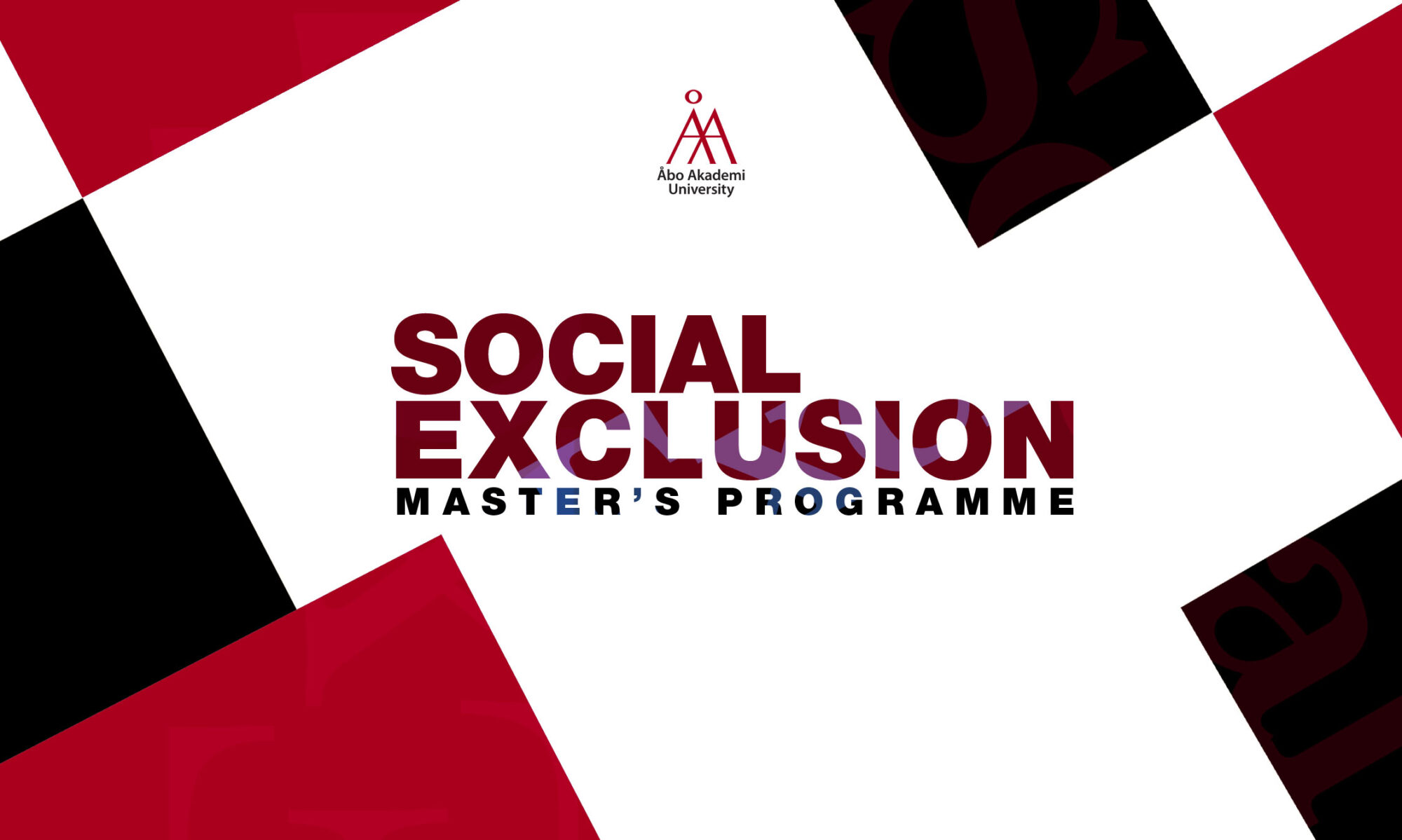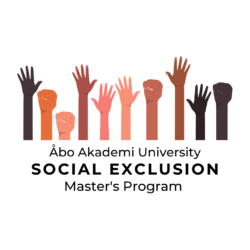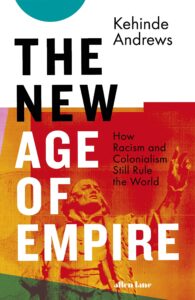To understand social Social Exclusion in the world we live in, honest discussions like these must have a place in our everyday understanding of the world.
Social Exclusion Library Shelf
We are pleased to announce that the Social Exlusion Master’s Degree Programme now has an official shelf in the Arken Library. Take a look at how to get there:
October 2021 Reading List: “Me and White Supremacy”
The second book for our Racial Justice, Racial Equity, and Anti-Racism Reading List is:
Me and White Supremacy shows readers how to dismantle the privilege within themselves so that they can stop (often unconsciously) inflicting damage on people of colour, and in turn, help other white people do better, too.
Layla F. Saad wrote Me and White Supremacy to encourage people who hold white privilege to examine their (often unconscious) racist thoughts and behaviours through a unique, 28-day reflection process. This guided journal, which is to be used in tandem with the book and includes the book’s original weekly prompts and lots of space for note-taking, is the perfect place to continue your antiracism journey. You will unpack:
· Week One: White Privilege; White Fragility; Tone Policing; White Silence; White Superiority; White Exceptionalism
· Week Two: Color Blindness; Anti-Blackness against Black Women, Black Men, and Black Children; Racist Stereotypes; Cultural Appropriation
· Week Three: White Apathy; White Centering; Tokenism; White Saviorism; Optical Allyship; Being Called Out/Called In
· Week Four: Friends; Family; Values; Losing Privilege; Your Commitments.
‘White supremacy is a violent system of oppression that harms Black, Indigenous and People of Colour. And if you are a person who holds white privilege, then you are complicit in upholding that harm, whether you realise it or not. This is not my opinion. This is fact. And if you are person who holds white privilege, the question you should be asking isn’t whether or not this is true, but rather, what are you going to do about it?’
The message covered in this book is urgent and the book is actionable and practical making it a must read. This is not just another book that talks about white supremacy, it is the book the book the read today!
‘Layla Saad’s ME AND WHITE SUPREMACY is an indispensable resource for white people who want to challenge white supremacy but don’t know where to begin’ –Robin DiAngelo, author of New York Times bestseller WHITE FRAGILITY
About the author
Layla Saad is a globally respected writer, speaker and podcast host on the topics of race, identity, leadership, personal transformation and social change. As an East African, Arab, British, Black, Muslim woman who was born and grew up in the West, and lives in the Middle East, Layla has always sat at a unique intersection of identities from which she is able to draw rich and intriguing perspectives. Layla’s work is driven by her powerful desire to ‘become a good ancestor’; to live and work in ways that leave a legacy of healing and liberation for those who will come after she is gone.
Me and White Supremacy is an indispensable resource for white people who want to challenge white supremacy but don’t know where to begin. She moves her readers from their heads into their hearts, and ultimately, into their practice. We won’t end white supremacy through an intellectual understanding alone; we must put that understanding into action.
Student Reflections: “My First Month in the Social Exclusion Master’s Programme”
Written by Steve Huerta Raygoza
Social Exclusion, as a concept, has been feeling somewhat unclear to me. I cannot seem to pinpoint a definition, nor can I describe the entire scope and importance of what I am studying. That, combined with the fact that I have undergone a major relocation to pursue my master’s here at Åbo Akademi, has left me confused and disoriented about my purpose while studying here. This week’s lectures have certainly helped me dismiss much of the uncertainty that I felt during the first month of my studies. I am very fortunate to be able to provide the blog post for this week’s class lectures. For the first time since starting at Åbo, I have felt a solid conceptual alignment between what we are studying and what I believe is essential for modern academics to understand to address the many systems of inequality that plague our globalized existence.
Firstly, I would like to discuss something that Amin, University Teacher of the SoEx: Key Approaches course and head of the SoEx program at Åbo Akademi, stated during class that genuinely resonated with me. He stated that while working on our master’s, we need to create our own theories instead of simply following the theories of others. Social Exclusion is a dynamic, relational, and multidimensional concept, and no single theory or explanation can apply universally to every context. Different systems that exclude groups and centralize power away from said groups require a different understanding of race, class, gender, etc. We must be reflexive and critical in our understandings of these systems. Understanding this has absolutely helped in the way that I am constructing the theoretical framework from which I comprehend these systems of exclusion.
This week’s lectures were based on developing an understanding of the different criteria that surround the concept of Social Exclusion. We analyzed two reading within the class, one from Hilary SIlver and another from Ruth Levitas. Silver provided her understanding of the various paradigms that surround Social Exclusion and chronic poverty, arguing that it “acknowledges the structural sources of the process rather than the characteristics of the excluded” and that developing an understanding of the structure of relations among excluded groups is crucial in understanding the process of Social Exclusion (Silver 2007). Levitas, instead, aims to understand how the concept of ‘paid work’ contributes to the process of Social Exclusion. By referencing the Poverty and Social Exclusion Survey, Levitas argues that poverty, itself, is a significant impediment to Social Inclusion and that even social participation and labor can still lead to Social Exclusion. Within this context, we must understand that exclusion does not arise simply due to “social inactivity”; instead, labor in some markets can lead to further exclusion (Levitas 2006).
Throughout the class, we often refer to an analogy wherein those with power exist as the center or most included groups, and people become excluded as they move to the outer rings of the circle. Although someone can maintain some wealth and power, existing closer to that central group than others who experience higher levels of exclusion, the fact remains that they are still ultimately excluded themselves. This conceptual understanding is really sticking with me. In my undergraduate studies, I heavily focused on how transnational capitalism operates through globalism, exploiting everyone’s labor, including these groups that exist closer to the center. I look forward to developing a better theoretical understanding of Social Exclusion to develop a praxis that can begin to shape a better future for the global working class.
References:
Levitas, Ruth, David Gordon, and Christina Pantazis. 2006. “The Concept and Measurment of Social Exclusion.” Pp. 122–60 in Poverty and social exclusion in Britain: The millenium survey. Policy Press.
Silver, Hilary. 2007. “The Process of Social Exclusion: The Dynamics of an Evolving Concept.” Chronic Poverty Research Centre.
AN OPEN LETTER TO THE ADMISSIONS OFFICE AND HEADS OF INTERNATIONAL MASTER’S DEGREE PROGRAMS OF ÅBO AKADEMI UNIVERSITY
Open Letter-ÅAU.pdf
Written by
Emilia Plichta, Jan Louie Uy, Niki Panera, Vera Linden
Students of Race, Racism and Antiracism course (2021)
_______________________________________________________________
In May 2021, the students of the Social Exclusion master’s Degree programme, along with students of the SoEx course Race, Racism and Antiracism, worked together to initiate a discussion within the university regarding the current English language requirement of admissions process for International Degree Programmes at Åbo Akademi. The letter generated quite a lot of interest and sparked an important discussion on the topic of language requirements for admission.
Student Reflections: “Reflections on the second week”
Written by Sandis Sitton & Hei Yuet Leung
For this second week’s lectures we spent more time getting further into the forms and dynamics of exclusion. A lot was talked about, and plenty of it could have ended up swirling around in vagary before getting lost, semi-forgotten somewhere in the notes, so I’ve been happy to have a reason to better work it over with one of our classmates to see what stuck. After we’d each done some reflecting on the lectures, I got together with Tracy, one of our fellow students, to see if we could combine our thoughts and what stuck out the most. I was delighted to see that, though her approach differed from my own, it demonstrated some of the analysis of exclusion which I’d found most interesting. This is what she had to say:
“The class has discussed the relationship between poverty, exclusion and access.
“According to Kofi Annan who is the Seventh Secretary-General of the United Nations, Extreme poverty anywhere is a threat to human security everywhere.
“Looking into the causal relationship, it is questioned that does employment status determine poverty or does poverty cause employment status? Employment status provides a sense of stability and security upon one’s financial status. Hence, the higher the stability of one’s employment status, the less likely one is to experience poverty.
“However, under the cycle of poverty, people with poverty may have limited resources to increase their and their children’s social mobility, such as the quality of education and thus, job opportunities. Furthermore, people with poverty may also experience psychological problems, such as depression and low self-confidence, which may hinder their willingness to participate or feel included in the community or whole society.”
I rather like the angle, as what I’ve been working over the most is the multidimensionality of exclusion and this week’s lecture covered precisely that. Exclusion can appear dynamically, and it can be social, political, cultural, and of course economic. The latter’s been obvious for some a while. Poverty, as Tracy indicates as well, is an issue the world’s leaders spend a lot of time thinking about, something I wouldn’t hesitate to say we all do. Our economic situation as individuals has a direct, immediate bearing on our quality of life, and it makes it an easy example for how exclusionary processes can deprive, but also create cycles that reinforce that deprivation.
Looking at something that operates in just the same way, we can take discriminatory voting laws into account. By setting the right policies in place, barriers can be created that separate people from access to their own political power on the basis of their skin color, religious background or sexuality, while also denying them the means of seizing it back. We can see this happening in all kinds of ways that might not be explicit or direct, but by their patterns operate in precisely the same way as those that can be found perpetuating cycles of poverty.
It reminds me of how frustrating the inequalities plaguing my own home country are, because they are never as straightforward as often presented. Addressing them takes insight, a wider perspective and a willingness to look for patterns such as these. Tracy closes her response on poverty with:
“To build a social security network, welfare is provided to the people in need, which includes those in poverty. It is discussed that welfare is a way to build equality by income redistribution. There are controversies that welfare lowers people’s motivation such as responsibilities on work, family supporting, as well as subtraction of wages. Hence, anti-poverty programs are given.”
Student Reflections: “Reflections on my First Week of Social Exclusion Key Approaches”
Written by Pemphero Banda and Kosar Mohammad Naeemi
Being back in class after a few years, was both an exciting and a scary experience. I used to hear a lot about imposter syndrome, starting my master’s degree got me closer to partaking in this universal experience. I shouldn’t lie I was consumed. I am sure if you are a young adult, on a verge of a new experience you know what I mean, this little animal can eat you up and if you are not careful you can succumb and not recognise the thrill of excitement that comes with a new experience. That was me, but the first class of Social Exclusion Key approaches changed everything for me. It reminded me that I was exactly where I needed to be at this point in my life. Not only was my excitement coming from how international the class is but also how real, deep and contextual the conversations are. I still remember how eye opening my very first lecture on power dynamics was. It got me thinking of the power I hold within myself and the spaces I occupy. The lecturer got me thinking of how inconstant the power dynamics are around me. It felt surreal for someone else to voice out the reality that we all are never neutral when approaching issues of social exclusion, either one of our dominant or subordinate identities are out to play and how with this reality I have the potential of being both an oppressor and the oppressed. You can imagine the disbelief I had; how can I, Pemphero be an oppressor. At the end, the reality is as individuals we have the power to write the narrative that we want to identify with even though reality does not Favor that idea as Chinua Achebe once said until the lions have their own historians, the history of the hunt will always glorify the hunter.
Racial Justice, Racial Equity, and Anti-Racism Reading. The New Age of Empire: How Racism and Colonialism Still Rule the World by Kehinde Andrews
The first book for our Racial Justice, Racial Equity, and Anti-Racism Reading List is:
“Colonialism and imperialism are often thought to be distant memories, whether they’re glorified in Britain’s collective nostalgia or taught as a sin of the past in history classes. This idea is bolstered by the emergence of India, China, Argentina and other non-western nations as leading world powers. Multiculturalism, immigration and globalization have led traditionalists to fear that the west is in decline and that white people are rapidly being left behind; progressives and reactionaries alike espouse the belief that we live in a post-racial society. But imperialism, as Kehinde Andrews argues, is alive and well. It’s just taken a new form: one in which the U.S. and not Europe is at the center of Western dominion, and imperial power looks more like racial capitalism than the expansion of colonial holdings. The International Monetary Fund, World Bank, World Trade Organization and even the United Nations are only some of these modern mechanisms of Western imperialism. Yet these imperialist logics and tactics are not limited to just the west or to white people, as in the neocolonial relationship between China and Africa. Diving deep into the concepts of racial capitalism and racial patriarchy, Andrews adds nuance and context to these often over-simplified narratives, challenging the right and the left in equal measure. Andrews takes the reader from genocide to slavery to colonialism, deftly explaining the histories of these phenomena, how their justifications are linked, and how they continue to shape our world to this day. The New Age of Empire is a damning indictment of white-centered ideologies from Marxism to neoliberalism, and a reminder that our histories are never really over”–
“The West is rich because the Rest is poor. Capitalism is racism.”
“Rebranding a racist product is not a step in the right direction, it is a kick in the teeth to all those who suffer the impacts of White supremacy.”
“China is becoming a more efficient version of the West”
“by creating enough opportunity for a Black middle class to exist, we have given fuel to the lie that everyone can make it if they would only just try hard enough…”
Offering no easy answers, The New Age of Empire is essential reading to understand our profoundly corrupt global system. A work of essential clarity, The New Age of Empire is a groundbreaking new blueprint for taking Black Radical thought into the twenty-first century and beyond.
You can borrow the book from the library at:
Day One – First Lecture on Social Exclusion 2021
Written by Martins Kwazema
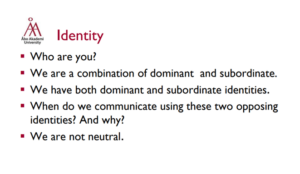
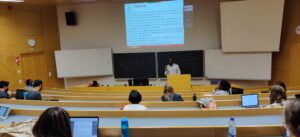
What is Social Exclusion?
In the Autumn of 2018, I joined the Master’s Degree Programme in Social Exclusion as one of the first group of students in the programme. Two years later, in 2020 I graduated and began working as a Project Assistant to the programme, helping to develop it as it entered into its third academic year with its third group of new students. Having gone through the Masters, both as a student and as staff, I thought I would take a moment to share some of my thoughts and experiences on how to understand this complicated term ‘social exclusion’.
The first step to understanding the term ‘social exclusion’ is to define it. Herein begins the struggle to encompass the term as a single entity as it can be broken down and defined in numerous complex ways; as is evident by the scholarly inability to reduce it to a single universal definition. A good definition to begin to understand it is the United Nations’ definition: “social exclusion describes a state in which individuals are unable to participate fully in economic, social, political and cultural life, as well as the process leading to and sustaining such a state” (United Nations 2016:18). Scholars such as Levitas et.al. (2007:9) and Popay et.al. (2008:2) further add to this definition by including that social exclusion is a complex, dynamic, and multi-dimensional process, driven by unequal power distributions in society, across four main dimensions – social, political, economic and cultural – that persists across different levels of society. Resources are thus accessed differently as a result of such processes, resulting in exclusions to participation in societal arenas. It is worth noting that the term has changed in meaning over the decades, as the notion of society has grown to encompass aspects of the ever-globalizing world.
Having navigated some definitions of social exclusion, perhaps it is best to give examples of social exclusion to better understand the complexity of the term. Perhaps a more relatable example of social exclusion would be that of labour market participation. Take for instance, an immigrant who migrates to a new country that has an entirely new language. One hindrance to labour market participation may be on the basis of language skills and competency, whereby employers choose not to hire an individual who does not possess sufficient language competency. On its own, this example may seem common practice on the basis of employment requirements for numerous reasons of their own. However, it is a good one to show the complexity and multi-dimensional aspects of social exclusion as it will be shown. In the first instance, exclusion occurs on the basis of employability until the individual can attain the necessary skills to engage in social participation. This period of attainment of the minimum required social capital is one of exclusion by which the individual is unable to access the resources of the country, as contrasted by other individuals who possessed higher levels of social capital (social capital in this case being sufficient language skills). This inability to access resources, as we have seen in the examples above, reflect an unspoken, unequal power distribution whereupon the attainment of such skills, for the most part, is left to the individual to attain the minimum required social capital in order to be included in social processes. This is further complicated if said individual applied to numerous jobs, all of which returned the same result on the basis of language competency. The added effect of numerous attempts may well be an intrinsic one, in the form of an internalised perception of being excluded. This takes on numerous forms and can include such things as race, ethnicity, nationality, sexuality, etc. if the individual were to perceive these as factors hindering their employability. This internalised exclusion may have added effects to the individual’s access to resources such as, and certainly not limited to, a withdrawal from participation on the basis of feeling excluded. Exclusion in this case, results from the individual’s own feeling of being excluded, which may apply thereafter to participation in such things as simply walking down a street due to such feelings.
This very generalised example can be broken down in numerous ways, however, the key point observable here, is that social exclusion can be very complex and must be looked at via the processes by which it is fuelled. It can be seen from many lenses, and many interpretations. Herein rests the problem with attaining a uniform definition of the term as it is for the most part, very specific to individuals, events, and cases; no two of which can be said to be exactly the same and thus defined as such. That is not to say, however, that studies of social exclusion are impossible. On the contrary, it is in the complexity of it that makes social exclusion worth studying. By understanding the dynamism of it, can we begin to work on finding ways of promoting and implementing practices of social inclusion!
References:
Levitas, Ruth. Pantazis, Christina. Fahmy, Eldin. Gordon, David. Lloyd, Eva. Patsios, Demi (2007). The Multi-Dimensional Analysis of Social Exclusion. Department of Sociology and School for Social Policy Townsend Centre for the International Study of Poverty and Bristol Institute for Public Affairs: University of Bristol. 1-75. <http://www.bris.ac.uk/poverty/downloads/socialexclusion/multidimensional.pdf>.
Popay, Jennie, Escorel, Sarah. Hernández, Mario. Johnston, Heidi. Mathieson, Jane. Rispel, Laetitia. (2008). Understanding and Tackling Social Exclusion: Final Report to the WHO Commission on Social Determinants of Health From the Social Exclusion Knowledge Network. 1-207. <https://www.who.int/social_determinants/knowledge_networks/final_reports/sekn_final%20report_042008.pdf?ua=1>.
United Nations (2016). Report on the World Social Situation 2016. In Leaving no one behind: the imperative of inclusive development. United Nations Publication.
